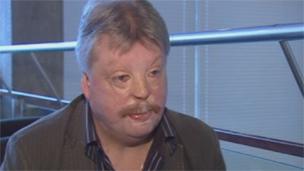Plea to log army stress in medical records to help PTSD
- Published
The Ministry of Defence should ensure veterans' service histories are logged in their medical records, claims an all-party report.
The assembly' health committee said it would mean the quick diagnosis of ex-services personnel with post-traumatic stress disorder (PTSD).
Chair Jonathan Morgan said those needing help were falling through the gaps in current services.
The MoD said it is exploring improving the transfer of information to GPs.
Figures show that in Wales 15-25 men and women leave the police and armed forces suffering from PTSD each year.
The AMs' review follows an investigation into the services available to former soldiers suffering from PTSD - psychological response to an event of an intensely traumatic nature which can take many years to surface.
It concludes there are gaps in medical notes because the MoD does not disclose "crucial" information about combat.
It suggests that even though defence organisations consider operational details to be confidential, their release could significantly speed up diagnosis of PTSD.

Falklands War veteran Simon Weston said people with PTSD had often been misdiagnosed
Mr Morgan said he wants the assembly government to work with the MoD to ensure that this information is transferred, with an opt-out system available.
"I believe very strongly that we have a moral duty to do all we can to make things a bit easier for veterans when they re-enter civilian life than they are now," he said.
"Otherwise we will end up with higher numbers of veterans who are homeless, suffering with mental and physical ill health whose families, as a consequence, also suffer.
"The British Medical Association told the committee that if the MoD had provided the information of injuries, treatments, backgrounds and experiences, it would help GPs to give a more accurate diagnosis more quickly."
The committee was also surprised to find a "lack of connection" between the people who are supposed to be delivering services to veterans.
The report also highlights how many veterans turn to substance misuse, and how addiction and depression is also often a problem.
Chris O'Neill, a former Royal Military Policeman now runs a charity Forces for Good, based in north Wales, to help veterans rejoin civilian life.
He told BBC Wales: "Nobody goes into the doctors and says they have PTSD but meanwhile lots of these veterans are being lost to the community because of drug or alcohol addiction or because they enter the criminal justice system.
"I think it is vital the MoD make these records available."
Falklands War veteran Simon Weston said: "The numbers of growing of ex-services personnel in prison so that tells you that there must be a problem.
'Medical'
"There's a growing problem that people have just been misdiagnosing - it's been depression, it's been this, it's been that, it's been the other - and people have been medicating people but they haven't actually been treating the problem."
He said GPs should be able to access military medical records to know how best to treat ex-services personnel.
An MOD spokesperson said the UK government is committed to improving the mental health of its serving personnel and veterans and will be implementing some changes in 2011.
"We are already looking at ways to improve the transfer of medical information to GPs and are running a pilot programme with some medical centres in England.
"We are planning to consult with NHS Wales and incorporate them into this process," the spokesperson said.
Prime Minister David Cameron asked Dr Andrew Murrison MP to undertake an independent study into the health of serving and ex-service personnel and the MoD said it was working in line with his recommendations.
The assembly government said it had received the committee's report and would consider its findings before responding.
- Published4 February 2011